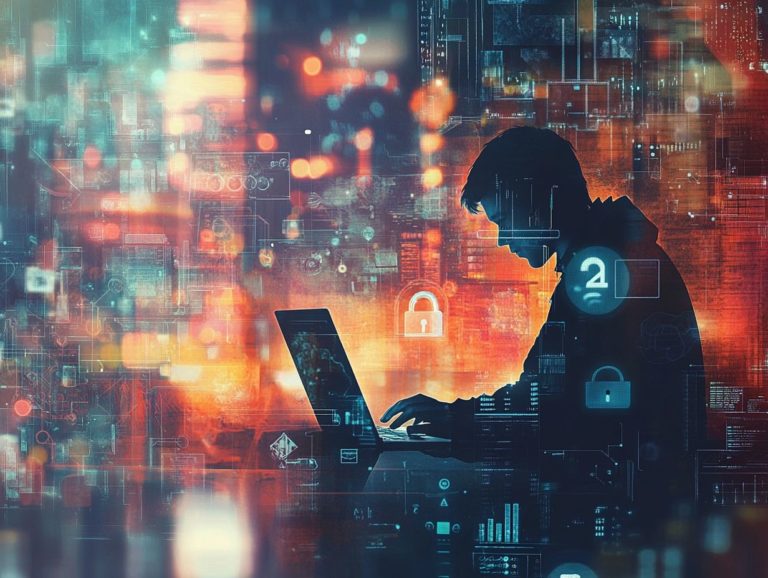The Impact of COVID-19 on Trade Secrets
In today s fast-evolving business landscape, trade secrets have become an invaluable asset for many organizations. As COVID-19 transformed the way you work, the urgency to safeguard private business information has only intensified.
This article delves into the core elements of trade secrets defining what they are, their significance, and the unique challenges that arise from remote work and increased information security risks during the pandemic.
You ll find insights into the legal implications and enforcement hurdles that have emerged. We will also explore potential changes for trade secrets in a post-COVID world.
Discover how to navigate this shifting terrain with confidence and foresight.
Contents
- Key Takeaways:
- Overview of Trade Secrets
- How COVID-19 Has Affected Trade Secrets
- Legal Implications of COVID-19 on Trade Secrets
- Strategies for Protecting Trade Secrets During the Pandemic
- Future Outlook for Trade Secrets in a Post-COVID World
- Frequently Asked Questions
- What are trade secrets and how has COVID-19 affected them?
- How has the increase in remote work impacted the protection of trade secrets during COVID-19?
- Has there been an increase in trade secret theft during the COVID-19 pandemic?
- How can businesses protect their trade secrets during the COVID-19 pandemic?
- What legal action can be taken if a business’s trade secrets are stolen during COVID-19?
- Are there any implications for trade secrets and international trade during COVID-19?
Key Takeaways:

Remote work has led to increased vulnerability of trade secrets, emphasizing the need for strong information security measures.
The pandemic has created urgent challenges that businesses must tackle to protect their secrets, requiring them to adapt their strategies accordingly.
Post-COVID, there may be changes to trade secret laws, and businesses should stay informed and prepared for these potential shifts.
Overview of Trade Secrets
Trade secrets are essential for safeguarding private business information that gives your business a competitive edge in various industries.
As a key component of the broader intellectual property framework referring to creations of the mind, including inventions and designs these confidential innovations, methodologies, and strategies become even more crucial during times of economic uncertainty, like the COVID-19 pandemic.
The legal landscape surrounding trade secrets requires you to implement robust protection protocols to shield these invaluable assets from unauthorized access and disclosure, especially in an era marked by heightened employee turnover and cybersecurity threats.
By understanding the nuances of your business operations and recognizing the importance of confidentiality, you can significantly enhance your organization s financial value and operational success.
Definition and Importance
Trade secrets refer to the confidential business information that gives you a competitive edge, encompassing everything from formulas and practices to processes, designs, instruments, and patterns.
These secrets can be the cornerstone of your company s success, offering unparalleled insights into your operations and innovations. By safeguarding such critical information, you can effectively thwart competitors and secure your position in the market.
Legal frameworks like the Uniform Trade Secrets Act and the Defend Trade Secrets Act are crucial for protecting these assets, giving you the power to pursue legal action in the event of theft or breach.
Confidentiality agreements are also critical tools, ensuring that your employees and partners maintain discretion regarding sensitive information.
Consider iconic trade secrets such as the recipe for Coca-Cola or Google’s search algorithm; both have been pivotal in shaping the identity and longevity of their respective brands.
How COVID-19 Has Affected Trade Secrets
The COVID-19 pandemic has fundamentally transformed the corporate landscape, prompting significant changes in how you protect your trade secrets and private business information.
With the sudden shift to remote work, you now face heightened risks associated with employee turnover, cybersecurity threats, and the potential for unauthorized disclosure of sensitive information.
These challenges require you to thoroughly examine your existing protocols, which are essential for safeguarding confidential information in a work-from-home environment.
As you navigate this new reality, grasping the intersection of public health and legal compliance becomes crucial for fostering a robust compliance culture and protecting your vital intellectual property assets.
Embrace these strategies to secure your future success!
Changes in Remote Work and Information Security

The shift to remote work has introduced new complexities in information security. Enhancing protection protocols is essential to safeguard trade secrets and confidential business information.
You now face the challenge of ensuring secure environments beyond traditional office settings. This transition has elevated the need for effective home surveillance measures, especially as you manage sensitive information from your residence.
Confidentiality agreements are updated to cover secure practices in remote environments. The evolving threat landscape has brought new cybersecurity risks, such as phishing attacks targeting home networks, urging you to reassess and adapt your security strategies.
By prioritizing both physical and digital safeguards, you can significantly reduce these risks and protect your valuable assets.
Legal Implications of COVID-19 on Trade Secrets
The legal implications of the COVID-19 pandemic on trade secrets present substantial challenges for enforcement and protection protocols, especially considering the impact of technology on trade secrets.
Navigating the changing regulations is crucial. You must adapt your strategies to effectively safeguard your valuable information.
Enforcement and Protection Challenges
Enforcement challenges in protecting trade secrets during the pandemic have become increasingly evident. You must navigate the complexities of remote work and shifting business dynamics.
Remote work has created opportunities for sensitive information to be unintentionally shared or accessed by unauthorized individuals. Traditional methods of safeguarding proprietary data are often insufficient.
The lack of in-person supervision complicates compliance with internal data protection policies. Many organizations, including yours, have likely felt vulnerable to cybersecurity threats as employees connect to company networks from less secure home setups.
To tackle these challenges, implement stringent access controls, employee training programs, and robust encryption methods. Regular audits and clear protocols for remote access can further strengthen your defenses, ensuring that crucial intellectual property remains well-protected in this ever-evolving landscape.
Strategies for Protecting Trade Secrets During the Pandemic
In the aftermath of the COVID-19 pandemic, adopting strong strategies to safeguard your trade secrets is essential. Protecting proprietary information becomes increasingly important as you navigate the complexities of remote work transitions.
Best Practices for Remote Work and Information Security

Implementing best practices for remote work is vital for safeguarding information security and protecting trade secrets in today s digital landscape.
Prioritize a proactive approach with stringent measures for technology access, ensuring that only authorized personnel can connect to sensitive systems.
Utilizing VPNs and two-factor authentication is an effective way to fortify your data against unauthorized access. Along with these safeguards, enforcing comprehensive confidentiality agreements establishes clear expectations of discretion among your team.
Regular employee training is critical; it keeps everyone informed about the latest security threats and appropriate responses.
By cultivating a culture of vigilance and preparedness, you can significantly reduce vulnerabilities and enhance overall security, ultimately preserving your intellectual assets.
Future Outlook for Trade Secrets in a Post-COVID World
The future outlook for trade secrets in a post-COVID world indicates a significant shift in the legal landscape. New challenges and opportunities are emerging for businesses like yours that seek to safeguard proprietary information.
As you navigate this evolving terrain, adapting your strategies is essential to effectively protect your valuable assets.
Predictions and Possible Changes to Trade Secret Laws
Future changes to trade secret laws will likely shape your legal landscape. You’ll need to be aware of compliance and enforcement measures.
As the regulatory environment transforms, it s essential to review your plans for protecting sensitive information. These adjustments may include putting better systems in place, such as updated employee training programs and more robust cybersecurity measures.
While larger corporations might possess the resources to adapt swiftly, smaller businesses could find themselves at a disadvantage unless they remain vigilant and proactive. Staying informed about legislative trends is critical. It not only ensures compliance but also strengthens your competitive edge.
Consider consulting with legal experts to decode these evolving laws and refine your operational tactics accordingly.
Frequently Asked Questions
What are trade secrets and how has COVID-19 affected them?

Trade secrets are confidential information that give a business a competitive advantage. COVID-19 has impacted trade secrets by increasing the risk of theft due to remote work and economic instability.
How has the increase in remote work impacted the protection of trade secrets during COVID-19?
Remote work has made it more challenging to protect trade secrets. Employees may not have secure systems or be as closely monitored as they would be in an office setting, increasing the risk of trade secret theft.
Has there been an increase in trade secret theft during the COVID-19 pandemic?
There has been a reported increase in trade secret theft during COVID-19. Companies are facing economic struggles, and employees may have easier access to sensitive information while working remotely.
How can businesses protect their trade secrets during the COVID-19 pandemic?
Protect your business by implementing strict confidentiality policies. Conduct regular training for employees on trade secret protection and utilize secure technology for remote work.
What legal action can be taken if a business’s trade secrets are stolen during COVID-19?
If a business’s trade secrets are stolen during the pandemic, they can take legal action through civil litigation, seeking damages for economic losses. In some cases, criminal charges may also be pursued.
Are there any implications for trade secrets and international trade during COVID-19?
The COVID-19 pandemic has led to disruptions in international trade and supply chains, potentially impacting the protection of trade secrets. Understanding the interplay of trade secrets and data privacy is crucial, and it is important for businesses to carefully consider the risks and take necessary precautions when engaging in international trade during this time.
For a better understanding of your rights and options, consult with a legal expert today!






